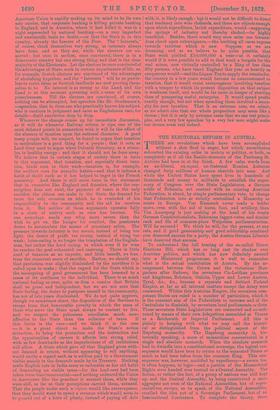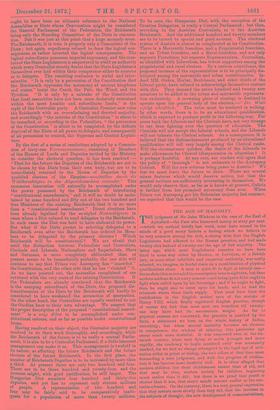THE ELECTORAL REFORM IN AUSTRIA. T HERE are revolutions which have
been accomplished without a shot fired in anger, but which nevertheless subverted the existing order in society or politics, or both, as completely as if all the Bastile-stormers of the Faubourg St. Antoine had been in at the finish. A few calm words from an un-liberal, un-equal, un-fraternal Russian Autocrat changed forty millions of human chattels into men. And while the United States have spent lives in hundreds of thousands and money in milliards to establish the supre- macy of Congress over the State Legislatures, a German noble of Bohemia, not content with an existing Austrian Federation, is about, by simple parliamentary vote, to change that Federation into as strictly centralised a Monarchy as exists in Europe. Von Bismarck never made a bolder move, even with the aid of horse, foot, and artillery, than Von Auersperg is just making at the head of his trusty German Constitutionalists, Bohemian faggot-votes, and similar rank and file of common-place Walpolean parliamentarism. Will he succeed ? We think he will, for the present, at any rate, and if good. generalship and good soldiership combined ever deserved success for a party, the Austro-German Liberals have deserved that success.
To understand the fall bearing of the so-called Direct Elections Bill, which has so long cast its shadow over Austrian politics, and which has now definitely entered into a Ministerial programme, it is well to remember what is the actual constitution of Austria. By the ar- rangement between the Crown and the victorious Hun- garians after Sadowa, the seventeen Cis-Leithan provinces and kingdoms, Bohemia, Galicia, Upper and Lower Austria, Tyrol, &c., &c., became a separate and distinct Federal Empire, so far as all internal matters except the Army were concerned. Within this Austrian Empire, the seventeen com- ponent States are ruled in a number of particulars, which it is the constant aim of the Federalists to increase and of the Centralists to diminish, by seventeen local parliaments or diets. These seventeen State Legislatures are connected and co-ordi- nated by means of their own delegations assembled at Vienna as a. Reichsrath or Imperial Parliament. All this is plainly in keeping with what we may call the histori- cal as distinguished from the political aspect of the Hapsburg monarchy. The Hapsburg monarchy is, his- torically speaking, a score of monarchies concentrated in a single and absolute monarch. When the absolute monarch had to dwindle into a constitutional sovereign, the logical con- sequence would have been to return to the separated States as much as had been taken from the common King. This con- sequence was, however, modified by expediency—a sworn foe, it often happens, to logic—and a portion of the Monarchical Rights were handed over instead to a Central Assembly. The fiction, or rather the fact, of a group of nations was still kept up, and the Central Assembly, by being constituted a mere aggregate not even of the National Assemblies, but of repre- sentatives, envoys, so to speak, of the National Assemblies, recalled the idea not of a Sovereign Parliament, bat of an International Conference. To complete the theory, there
ought to have been an ultimate reference to the National Assemblies or Diets whose Convocation might be considered the General Parliament of the Federation, the Reichsrath being-only the Standing Committee of the Diets in convoca- tion. But it was just at this point that a huge anomaly arose. The Eeichsrath, it is true, is properly only a Committee of the Diets ; but again expediency refused to draw the logical con- sequences, or rather inverted the logical consequences. The logical subordinate possesses imperial supremacy, and the crea- ture of the State Legislatures is empowered to wield an authority which every Centralist stoutly denies that the State Legislatures themselves ever had within their competence either to exercise or to delegate. The resulting confusion is awful and inter- minable. "It is only by a perversion of the Constitution that the Beicharath oppresses the autonomy of ancient kingdoms and states," insist the Czech, the Pole, the Wend, and the Tyrolian. "It is only by a mistake of the Constitution that local assemblies have not been more decisively restrained within the most humble and subordinate limits," is the reply of the Centralist party. A Centralist Premier now rules the Reichsrath with an overwhelming and devoted majority, and accordingly " the mistake of the Constitution " is about to be remedied, or according to the Federalists, " the perversion of the Constitution " is about to be completed, by the definite deprival of the Diets of all power to delegate, and consequently of all pretension to control, the Supreme and Central Legisla- ture.
By the first of a series of resolutions adopted by a Commis- sion of forty-one Vertrauensmitnner, consisting of Members of the Houses of Lords and Deputies invited by the Ministry to consider the electoral question, it has been resolved :- "That for the future the Deputies of the Reichsrath are not to be chosen by the Diets from their own body, but are to be immediately returned to the House of Deputies by the qualified electors of the Empire—unmittelbar durch die Wahlberechtigten in das Abgeordnetenhaus entsendet." This enormous innovation will naturally be accomplished under the power possessed by the Reichsrath of introducing " constitutional amendments," and it will no doubt be main- tained by some hundred and fifty out of the two hundred and four Members of the existing Reichirath that it is no more than a " constitutional amendment." Direct elections have been already legalised by the so-styled Nothwahlgesetz in cases where a Diet refused to send delegates to the Reichsrath. In such cases the Diet was held to have abdicated its power. But what if the Diets persist in selecting delegates to a Reichsrath even after the Reichsrath has ordered its Mem- bers to be delegated by the primary electors ? Which Reichsrath will be constitutional ? We are afraid that until the distinction between Federalists and Centralists, Clericals and Liberals, Nationalists and Imperialists, Slave and Germans, is more completely obliterated than at present seems to be immediately probable, the one side will
continue to say that Prince von Auersperg has " amended " the Constitution, and the other side that he has " violated " it.
As we have pointed out, the anomalies complained of are entwined with the very roots of the existing Constitution. If the Federalists are already convinced that the Reichsrath is the usurping subordinate of the Diets, the proposed dis- franchisement of the Diets by the Reichsrath will hardly be considered to have weakened the accusation of usurpation. On the other hand, the Centralists are equally resolved to cut the Gordian knot to their own advantage. We suspect that the proper description of the proposed " constitutional amend- ment " is a coup d'etat to be accomplished under con- stitutional colours, and as far as possible under constitutional forms.
Having resolved on their object, the Centralist majority are resolved to do their work thoroughly, and accordingly, while the Reichsrath of the future is to be really a central Parlia- ment, it is also to be a Centralist Parliament, if a little innocent management can make it so. This management is twofold in its nature, as affecting the future Reichsrath and the future electors of the future Reichsrath. In the first place, the number of Reichsrath Deputies is to be increaaea by more than a third. At present there are only two hundred and four. There are to be three hundred and twenty-four, and the increase might, with good justification, be still larger. The Hungarian Diet numbers four hundred and thirty-five deputies, and yet has to represent only sixteen millions of people. A representation of two hundred and four may be fairly said to be comparatively inade- quate for a population of more than twenty millions.
To be sure, the Hungarian Diet, with the exception of the Croatian Delegation, is really a Central Parliament ; but then, according to the Austrian Centralists, so is the Austrian Reichsrath. And the additional hundred and twenty members are to be turned to special and good account. The electoral system of Austria is almost as complicated as its Constitution. There is a Mercantile franchise, and a Proprietorial franchise, and an Urban franchise, and a Rural franchise, and not only separate Franchises, but separate Representatives. Centralism, as identified with Liberalism, has fewest supporters among the proprietorial and rural electors. By a curious coincidence, the proposed increase of the representation is to be principally dis- tributed among the mercantile and urban constituencies. In- deed MM. Giskra, Herbst, Rechbauer, and other chiefs of the Liberal party, have refused to acknowledge themselves content with this. They demand the entire hundred and twenty new members to be added to the urban and mercantile representa- tion exclusively. A crowning piece of strategy is destined to operate upon the general body of the electors,—" Die Wahl erfolgt schrifilich:" The votes must be tendered in writing. In other words, there is to be an educational qualification, which is expected to produce profit in the following way. For years back the Liberals and the Clericals have, not very strange to say, been fighting over the question of education. The Clericals will not accept the Liberal schools, and the Liberals will not tolerate the Clerical schools. As a consequence, it is believed that the disfranchisement produced by an educational qualification will tell very largely among the Clerical ranks. Will the circumstance quicken the desire of the Liberals to make allowances for Clerical idiosyncrasies in education I It is perhaps doubtful. At any rate, our readers will agree that ' the policy of " thorough " is not unknown to the Auersperg Cabinet. Will the new reforms bring peace to Austria ? We fear we must leave the future to show. There are several minor features which would deserve notice, but that the general outlines are sufficiently interesting in themselves. We would only observe that, as far as is known at present, Galicia is farther from her promised autonomy than ever. When Prince von Auersperg got his Bohemian majority last summer, we expected that this would be the case.







































 Previous page
Previous page